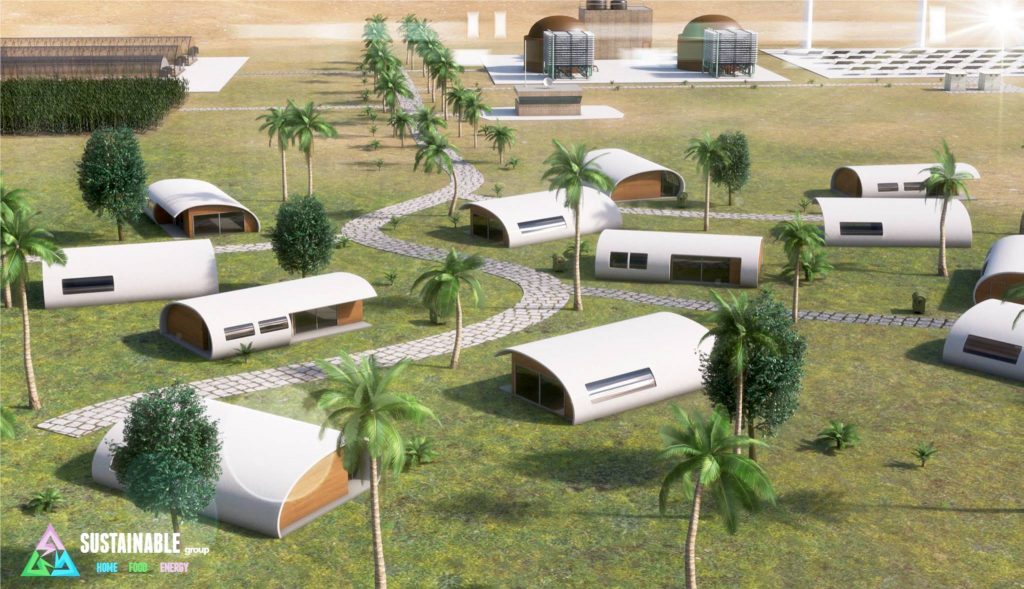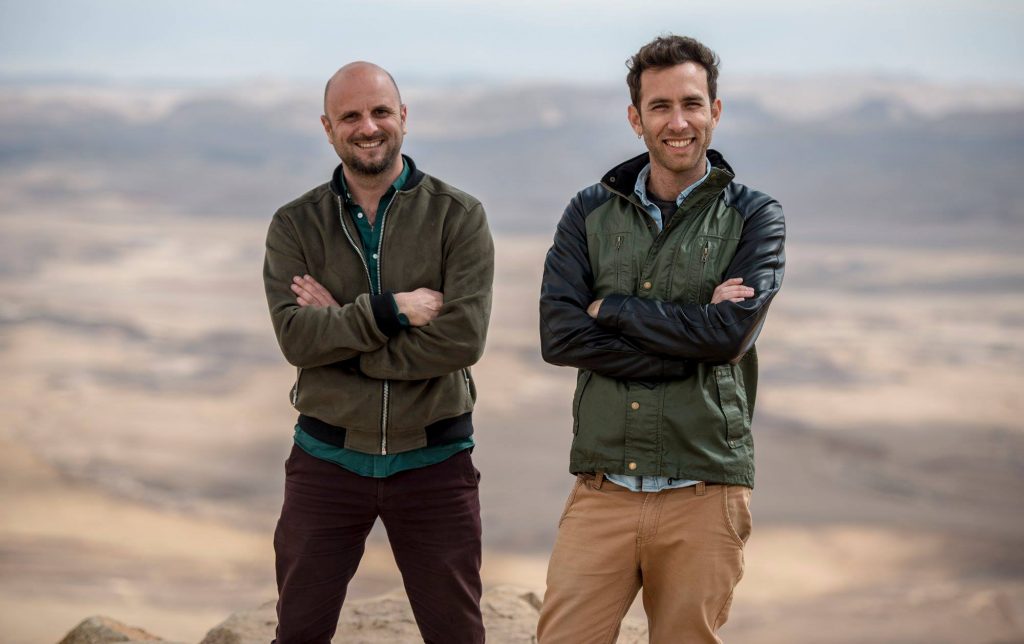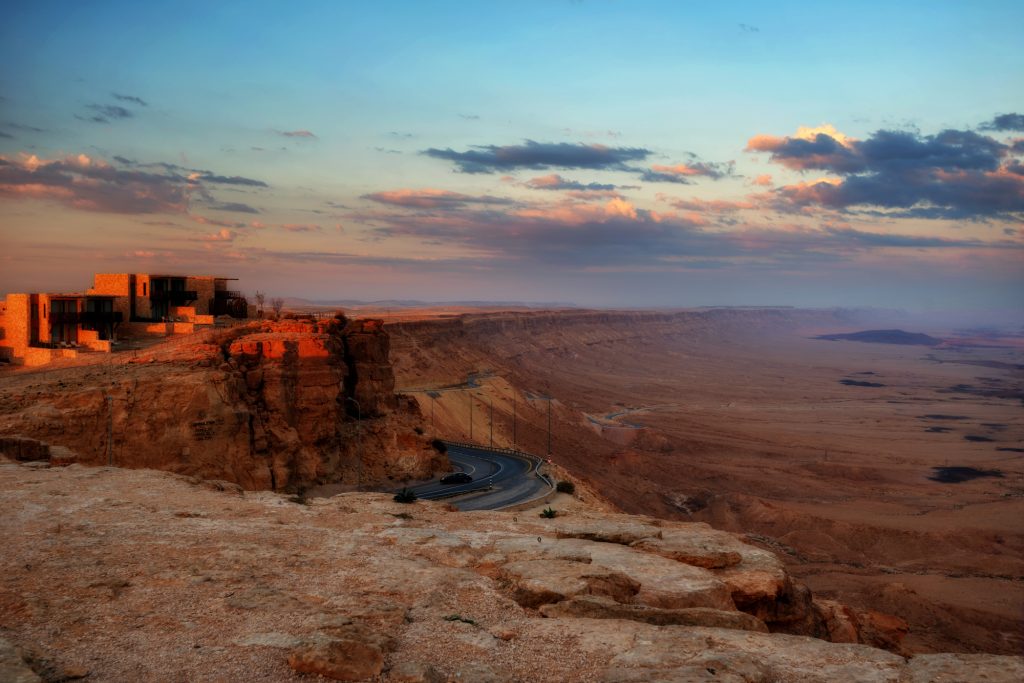Israeli Sustainability Initiative To Pilot Village-In-A-Box With Its Own Water, Food, Energy Systems

No matter how hard we try, living a sustainable life is a constant uphill battle. We carry around metal straws and reusable bags to cut down on plastic consumption, turn off the water while brushing our teeth to conserve, try to buy organic produce to support sustainable agriculture. And yet, we all have a carbon footprint – some negative environmental impact that is just unavoidable.
Our planet’s resources – clean water, soil, clean air – are not infinite and Earth Overshoot Day, when humankind will have used up its allowance of resources for the year (according to calculations by the Global Footprint Network, a sustainability-focused think tank), was marked earlier this week. Five months early.
Israeli entrepreneurs Jonathan Haran and Victor Hajaj want to see drastic transformation in how we think about resources and consumption rates. And they’re aiming to effect this change on the societal and communal level.
SEE ALSO: 5 Israeli Kibbutzim Embracing Sustainable Living To Curb Climate Change
“All the resources we need for living are part of the food-water-energy-nexus,” Haran tells NoCamels in a phone interview. “That’s all we need.”
Societies, he says, have just not understood this well enough yet, and so many municipalities, regions, and countries are managing the three realms independently of each other. “That’s inefficient because, on a macro level, food, water and energy really cannot be separated from each other. They are inseparably intertwined,” he explains.
The leapfrog in sustainability can therefore only come from an approach that sees this nexus as a whole, and enables innovation in all three sectors, he says.
Haran and Hajaj founded The Sustainable Group in 2017, an initiative that seeks to establish sustainable neighborhoods, with a focus on developing countries, while integrating technological systems “to provide for residents’ basic human needs without being dependent upon state infrastructures,” the group says. At a later stage, the systems may provide resources for the wider infrastructure network.
These technological systems include energy production systems (sun, steam, solar, hydrogen, turbines, wind, etc), food production systems (hydroponic greenhouses, aquaponics, permaculture and organics), water production and desalination systems, infrastructure and innovative sewage systems, computing systems that manage resources and report malfunctions, and construction and development systems, the group says.

Working with a team of top-notch scientists from different professional backgrounds, The Sustainable Group has developed two core products.
First is the “village in a box,” a complete, shippable construction set to build a fully integrated village with an infrastructure solution that supplies communities with housing, energy, food, and water.
“Especially in remote areas that have weak infrastructure, taking this decentralized approach can have a huge impact,” Haran tells NoCamels. By giving communities their own, independent water, energy and food supplies, residents can use renewable energy and tap into the synergy of systems to their full extent, growing food locally through vertical farming, putting the village’s waste to good use and recycling water, he says. It can be an incredibly efficient approach to resource management which directly translates into as much as a 35 percent decrease in costs of living, Haran adds.
“The questions we looked at were: What will the future of community and housing look like? What challenges will humanity face? Should our homes be flexible and smart and know how to work for us, to create economic and existential security for us? Yes! How do we do that?” Haran wrote in a Facebook post earlier this year.
Sign up for our free weekly newsletter
SubscribeThe challenge, he wrote, is “how to deliver more infrastructure solutions that will keep up with the fast growth of population and know how to adapt to changes. Village-in-a-box is the future of communities. A community that is sustainable and resilient; productive and self-sufficient. It can be built anywhere on the globe,” he said.
And the model is not just for villages. After all, big population centers around the world are where most resources are squandered, and where fundamental change could have the greatest impact.
The Sustainable Group is offering its resource-distribution software as a separate service. The AI mechanism is designed to learn the behavior of both humans and the environment, to understand how everything works together, after which it will be able to tell the integrated food-water-energy-system how to use its current resources in the most sustainable way.
“With that, we can save 30 percent of wasted energy, which leads to an impressive cost reduction,” says Haran.
The software is still in development and “should be done by the end of the year,” Haran tells NoCamels. “This ‘software-only’ solution would be great for cities or for industry, basically for everyone who wants to apply real-time resource management.”
The Sustainable Group recently participated in the Chivas Venture Competition, a no-strings-attached $1 million contest first founded in 2014 for social entrepreneurs with big ideas for solving the world’s biggest social and environmental issues. The Israeli group made to the finals, but the top spot went to a project from Mexico that proposes to convert agricultural waste into a natural sugar substitute.
The Sustainable Group is now focused on a joint venture with the Arava Institute for Environmental Studies to build a neighborhood based on its proposed model as a sort of proof-of-concept. Construction is set to begin next year in a kibbutz close to Mizpe Ramon. The village has been dubbed “Qayma” for now and registration for the first carbon-negative village in Israel is open.

“That’s a great place to start,” explains Haran “since Mizpe Ramon is the most remote city in Israel. If it works here, in the middle of the desert, that’s great proof that it can work anywhere in the world.” And especially in developing countries where many people are at “the mercy of nature,” the group says. Humankind, they write, has already severely impacted natural systems through “air pollution, mining and as a result of the quick development of unsustainable energy based on fossil fuels, the destruction of the oceans of fish stocks, pollution of streams and deep aquifers, deforestation, harm to the food chain and natural ecology that plants and animals depend on.” This is especially felt in these countries .
SEE ALSO: These 4 Israeli Startups Are Leading Sustainability Efforts In The Food Sector
Haran and Hajaj also want to show that living sustainably has nothing to do with being a “tree hugger,” as Haran emphasizes. “Sustainability is for everyone, and The Sustainable Group aims to give back control over resource consumption to the communities themselves. That is not just a selfless social endeavor, but also highly economical.”
The project is garnering interest in neighboring countries and communities in Israel, Haran says. Resource scarcity is especially pronounced in the Middle East. Haran tells NoCamels that The Sustainable Group is “already working with some Bedouin and Arab communities in Israel,” and would like to see more such cooperation in the future.
For now, the pilot project in Mizpe Ramon will be the next big step on the way to sustainable community living.
Related posts

Editors’ & Readers’ Choice: 10 Favorite NoCamels Articles

Forward Facing: What Does The Future Hold For Israeli High-Tech?

Impact Innovation: Israeli Startups That Could Shape Our Future



Facebook comments